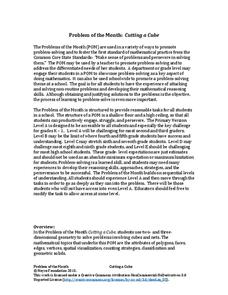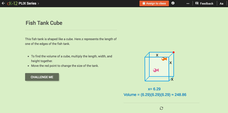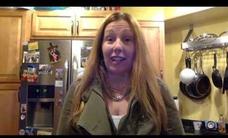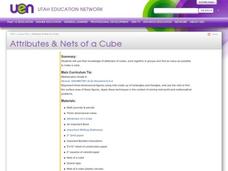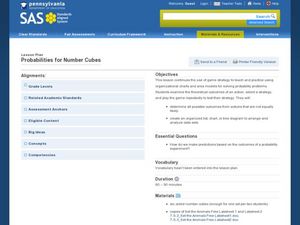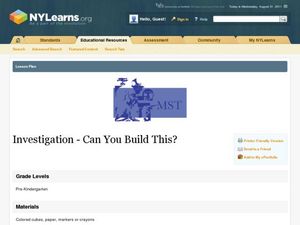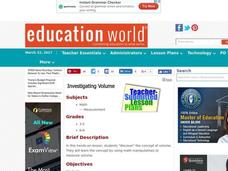Curated OER
Addition Facts: Cubes
In this addition facts worksheet, students fill in the missing numbers to the number sentences that are represented by cubes and solve the problem. Students solve 6 problems.
EngageNY
Graphing Cubic, Square Root, and Cube Root Functions
Is there a relationship between powers and roots? Here is a lesson that asks individuals to examine the graphical relationship. Pupils create a table of values and then graph a square root and quadratic equation. They repeat the process...
Noyce Foundation
Cutting a Cube
Teach the ins and outs of the cube! A series of five K–12 level activities explore the make-up of the cube. The beginning lessons focus on the vocabulary related to the cube. Later lessons explore the possible nets that describe a cube....
West Contra Costa Unified School District
Graph Square Root and Cube Root Functions
Scholars first learn to graph square root and cube root functions by creating a table of values. They then learn how to graph functions from transformation of the graphs of the parent square root and cube root functions.
Concord Consortium
Squares and Cubes
The task is simple, but the solution is a little more complex. Learners must find the smallest number that results in a perfect square when multiplied by two and a perfect cube when multiplied by three. The task requires an analysis...
Centre for Innovation in Mathematics Teaching
Building Solids Using Unit Cubes
Here is a using unit cubes to build solids worksheet in which learners use unit cubes to make the given solids. They color mirror images of the solids, build solids using two cuboid pieces, and build solids before determining the...
Curated OER
Maus: Cubing Questioning Strategy
Maus is the text for a postreading activity that has class members using a cubing strategy to analyze, in depth, topics (racism, past and present, forgetting/remembering the Holocaust, representing the Holocaust) associated with Art...
Curated OER
The Cube and Coin Challenges
Second graders participate in several games based on colored cubes and coins. They try to figure out the relative rate at which things happen and assess the concept of playing a fair game with their peers. Each student compare familiar...
DiscoverE
Keep-a-Cube
Waxed paper, newspaper, or aluminum foil? Keeping an ice cube from melting may require one or more of these materials. Learners design a box that will provide insulation so an ice cube stays intact for at least 90 minutes.
CK-12 Foundation
Sum and Difference of Cubes: Stacking Blocks
Investigate polynomial factoring patterns by finding a connection to volume. As learners build a three-dimensional solid from smaller solids, they convert the visual model to a mathematical expression. Their models represent the sum of...
CK-12 Foundation
Algebra Expressions with Exponents: Fish Tank Cube
There's nothing fishy about this resource. A slider interactive lets users adjust the side length of a fish tank cube. It aids in seeing changes in the volume and how to express the volume using an algebraic expression.
Novelinks
The Adventures of Tom Sawyer: Cubing Strategy
The toss of a die determines what questions your pupils will answer in this lesson. Learners respond to questions based on Bloom's taxonomy, discussing The Adventures of Tom Sawyer with classmates along the way. They finish by writing up...
DiscoverE
At Home: Keep a Cube Activity
Let cooler heads prevail. Future engineers first learn about heat transfer and insulation. They then design and build a contraption that will prevent an ice cube from melting for as long as possible.
Center for Innovation in Education
Unifix Cubes
Support young mathematicians with building a strong foundational number-sense using this series of printable Unifix® cube strips. Adaptable to the teaching of a variety of different concepts, from basic counting and cardinality, to...
Math eBook
Cube Root
In this cube root worksheet, learners determine the cube root of given numbers. This one-page worksheet contains 16 problems.
Curated OER
Commutative Cubes
In this commutative property worksheet, students use number cubes to create equations where they demonstrate the commutative property. Students fill in 8 equations to a chart and answer 3 questions.
Curated OER
Attributes & Nets of a Cube
Third graders engage in a lesson that focuses on the attributes and forming of a cube. They construct a cube using different combinations while comparing a square with only two-dimensions. Students fold paper while following the...
Curated OER
Probabilities for Number Cubes
Young scholars explore the concept of probability. For this probability lesson, students roll a six-sided number cube and record the frequency of each outcome. Young scholars graph their data using a frequency chart and keep...
Curated OER
Ordinary People: Cubing Strategy
Readers of Ordinary People employ a cubing strategy based on Bloom’s Taxonomy to analyze, from multiple perspectives, an excerpt from Chapter 10 of Judith Guest’s novel. The excerpt, a rationale and complete directions for the...
Curated OER
Probabilities using Colored Cubes as Manipulatives
In this statistics worksheet, students model probabilities by using colored cubes to solve word problems. There are 4 questions to solve.
Teach Engineering
Boxed In and Wrapped Up
If cubes have the smallest surface area, why aren't there more cube-shaped packages? Scholars take a box in the shape of a rectangular prism, cut it up, and make new boxes in the shape of cubes with the same volume. They then brainstorm...
Curated OER
Investigation--Can You Build This?
Early learners explore shapes using colored blocks. They first get some hands-on time with the blocks and then look at beginning math concepts regarding spatial relationships. They work with a partner to build a 6-8 block tower...
Education World
Investigating Volume
Explore the concept of volume using unit cubes. Working individually or in small groups, your class measures with a ruler in inches and calculates the volume of various rectangular household boxes (provided by the teacher) and completes...
Curated OER
Recognizing 3-D Shapes, Part 2
Take your math lesson to another dimension with this lesson about 3-D shapes! First graders label cones, cylinders, pyramids, spheres, cubes, and prisms, and then count the number of each shape in a collective picture. A great way to...
Other popular searches
- Cubing Activities
- Cubing Strategy
- Cubing Reading
- Writing Cubing
- Cubing Writing
- Writing Cubing Activities
- Cubing Math
- Squaring and Cubing
- Cubing for Biology
- Cubing Activities English
- Cubing + Writing
- Cubing Strategy Math




